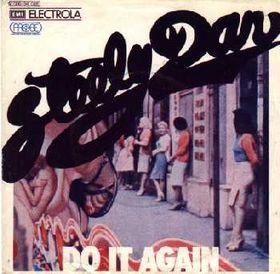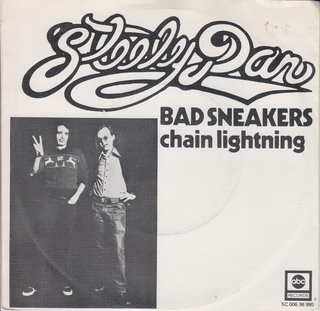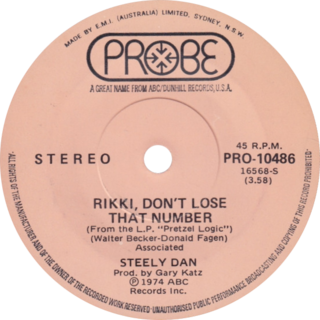
Steely Dan is an American rock band founded in 1971 in New York by Walter Becker and Donald Fagen. Originally having a full band lineup, by the end of 1974 Becker and Fagen chose to stop playing live and continue Steely Dan as a studio-only duo, utilising a revolving cast of session musicians. Rolling Stone has called them "the perfect musical antiheroes for the seventies".

Pretzel Logic is the third studio album by American rock band Steely Dan, released by ABC Records on February 20, 1974. It was recorded at the Village Recorder in West Los Angeles, California, with producer Gary Katz. The album was Steely Dan's last to be made and released while the group was still an active touring band, as well as the final album to feature the band's full quintet-lineup of Becker, Fagen, Denny Dias, Jim Hodder, and Jeff "Skunk" Baxter, though it also features significant contributions from many prominent Los Angeles-based studio musicians.

Donald Jay Fagen is an American musician who was the co-founder, lead singer, co-songwriter, and keyboardist of the band Steely Dan, formed in the early 1970s with musical partner Walter Becker. In addition to his work with Steely Dan, Fagen has released four solo albums, beginning with The Nightfly in 1982, which was nominated for seven Grammys.

Can't Buy a Thrill is the debut studio album by American rock band Steely Dan, released by ABC Records in November 1972. It was written by band members Walter Becker and Donald Fagen, and recorded in August 1972 at the Village Recorder in Los Angeles with producer Gary Katz. The album is one of Steely Dan's most stylistically eclectic, encompassing the sounds of soft rock, folk rock, jazz-rock and pop, alongside philosophical, elliptical lyrics.

Aja is the sixth studio album by the American jazz rock band Steely Dan, released by ABC Records on September 23, 1977. On the album, band leaders Donald Fagen and Walter Becker pushed Steely Dan further into experimenting with different combinations of session players, enlisting the services of nearly 40 musicians, while pursuing longer, more sophisticated compositions and arrangements.

Countdown to Ecstasy is the second studio album by American rock band Steely Dan, released by ABC Records in July 1973. It was recorded at the Village Recorder in West Los Angeles, California, except for Rick Derringer's slide guitar part for "Show Biz Kids", which was recorded at Caribou Ranch in Nederland, Colorado. After the departure of vocalist David Palmer from Steely Dan, the group recorded the album with Donald Fagen singing lead on every track.

The Royal Scam is the fifth studio album by American rock band Steely Dan, released by ABC Records in 1976; reissues have been released by MCA Records since ABC Records was acquired by MCA in 1979. It was produced by Gary Katz. In the United States, the album peaked at number 15 on the Billboard Top LPs & Tape chart, and it has been certified Platinum by the Recording Industry Association of America (RIAA).

Gaucho is the seventh studio album by the American rock band Steely Dan, released by MCA Records on November 21, 1980. The album marked a significant stylistic shift for the band, with more focus on rhythm and atmosphere than their earlier work, but the recording sessions demonstrated the group's typical obsessive nature and perfectionism, as they used at least 42 different musicians, spent over a year in the studio, and far exceeded the original monetary advance given by the record label. At the 24th Annual Grammy Awards, Gaucho won Best Engineered Recording – Non-Classical, and was nominated for Album of the Year and Best Pop Performance by a Duo or Group with Vocals.

"Kid Charlemagne" is a song by the rock group Steely Dan, which was released as a single from their 1976 album The Royal Scam as its opening track and reached number 82 in the Billboard charts. It is a fusion of a funk rhythm and jazz harmonies with rock and roll instrumentals and lyrical style. The guitar solo by jazz fusion guitarist Larry Carlton was ranked #80 in the list of the 100 greatest guitar solos by Rolling Stone.

"Deacon Blues" is a song written by Walter Becker and Donald Fagen in 1976 and recorded by their group Steely Dan on their 1977 album Aja. It peaked at number 19 on the Billboard charts and number 17 on the U.S. Cash Box Top 100 in June 1978. It also reached #40 on the Easy Listening chart. In Canada, it peaked at #14, a position it occupied for two weeks, and #20 Adult Contemporary. In 2021, it was listed at No. 214 on Rolling Stone's "Top 500 Greatest Songs of All Time".
Dennis Dias is an American guitarist, best known for being a founding member of Steely Dan.

"Reelin' In the Years" is a song by American rock band Steely Dan, released as the second single from their 1972 debut album, Can't Buy a Thrill. It peaked at No. 11 on the US Billboard Hot 100 chart and at No. 15 in Canada.

"Do It Again" is a 1972 song composed and performed by American rock group Steely Dan, who released it as a single from their debut album Can't Buy a Thrill as its opening track. The single version differed from the album version, shortening the intro and outro and omitting the organ solo.

"Pretzel Logic" is a song written by Walter Becker and Donald Fagen, released as a single by Steely Dan from their album Pretzel Logic, originally in 1974 by ABC Records. It reached number 57 in the Billboard charts.
"Any Major Dude Will Tell You" is a song written by Donald Fagen and Walter Becker that was first released by Steely Dan on their 1974 album Pretzel Logic. It was also released as the B-side of the first single from that album "Rikki Don't Lose That Number". It was later released on several of the band's compilation albums.

"Bad Sneakers" is a song by jazz rock band Steely Dan. It was released as the second single and track on their 1975 album Katy Lied. Producer Gary Katz later regretted not releasing the song as the first single.

"Rikki Don't Lose That Number" is a single released in 1974 by rock/jazz rock group Steely Dan and the opening track of their third album Pretzel Logic. It was the most successful single of the group's career, peaking at number 4 on the Billboard Hot 100 in the summer of 1974.

"FM (No Static at All)" is a song by American jazz-rock band Steely Dan, the title theme for the 1978 film FM. It made the US Top 40 that year when released as a single, a success relative to the film. Musically, it is a complex jazz-rock composition driven by its bass, guitar and piano parts, typical of the band's sound from this period; its lyrics look askance at the album-oriented rock format of many FM radio stations at that time, in contrast to the film's celebration of that medium.

"Josie" is a song written by Walter Becker and Donald Fagen and first released by Steely Dan on their 1977 album Aja. It was also released as the third single from the album and performed modestly well, reaching number 26 on the Billboard Hot 100 and number 44 on the Easy Listening chart that year. It has appeared on several Steely Dan live and compilation albums.
"Aja" is a jazz rock song, with elements of jazz fusion and progressive rock, by the American rock band Steely Dan from the album of the same name, their sixth studio album, released in 1977. Composers Becker and Fagen play guitar and synthesizer, respectively, with studio musicians playing the other parts. Fagen sings lead vocals. Production duties were handled by Gary Katz; the album was released through ABC Records. Musically, it is tonally sophisticated and a structurally complex work that was praised upon release as the most ambitious track the duo had ever attempted. The song's lyrics voice the interior monologue of a man who runs to the title character to escape the stresses of his life "up on the hill." Fagen claimed that it was inspired by the relative of an acquaintance, who had married a Korean woman named Aja. He has described the song as being about the "tranquility that can come of a quiet relationship with a beautiful woman."

















